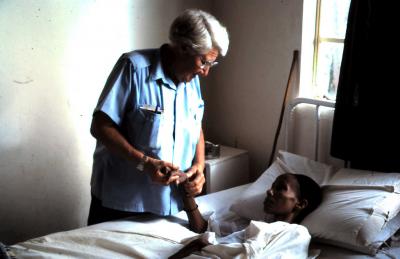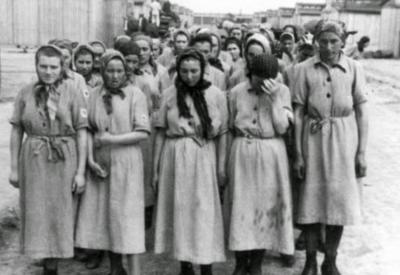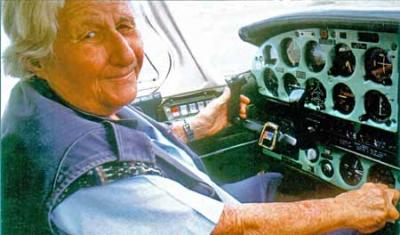In 2010, John Heminway wrote a feature for the Financial Times entitled “A Legendary Flying Doctor’s Dark Secret.” The doctor was Anne Spoerry, renowned and respected for providing emergency medical care in Africa for more than 30 years until her death in Nairobi in 1999. Richard Leakey had praised her for saving “more lives than any other individual in east Africa – if not the whole continent.” In 1964, Spoerry obtained her pilot’s license and became known as the “legendary flying doctor.” As a young journalist and filmmaker, Heminway had met Spoerry in 1980, and in 1992 he interviewed her for a PBS documentary.
 Through the years she brushed off his inquiries about her past, and apparently he was not motivated or provoked to dig deeper. But it was known that she, when a medical student, had been arrested in Paris by the Gestapo in 1943 for having joined the French Resistance movement. From Fresnes Prison she was transferred by train to Ravensbrück, a concentration camp for female prisoners located 90 kilometers north of Berlin. Heminway wrote in the Financial Times, “Three years before she died, Spoerry wrote a memoir, They Call Me Mama Daktari. Maddeningly, she condensed the 16 months that began with her transfer from Fresnes in January 1944, into one paragraph, ending: ‘The horrors of Ravensbrück are described in detail in Germaine Tillion’s book Ravensbrück. It is, I believe, the definitive work on the subject.’”
Through the years she brushed off his inquiries about her past, and apparently he was not motivated or provoked to dig deeper. But it was known that she, when a medical student, had been arrested in Paris by the Gestapo in 1943 for having joined the French Resistance movement. From Fresnes Prison she was transferred by train to Ravensbrück, a concentration camp for female prisoners located 90 kilometers north of Berlin. Heminway wrote in the Financial Times, “Three years before she died, Spoerry wrote a memoir, They Call Me Mama Daktari. Maddeningly, she condensed the 16 months that began with her transfer from Fresnes in January 1944, into one paragraph, ending: ‘The horrors of Ravensbrück are described in detail in Germaine Tillion’s book Ravensbrück. It is, I believe, the definitive work on the subject.’”
 But the definitive work on the camp today is Sarah Helm’s Ravensbrück (Nan A. Talese/Doubleday, 2014) in which Spoerry appears first on page 445 as a camp doctor in the tuberculosis and “lunatic” wards who had taken the false name “Dr. Claude.” Just after her death, Spoerry’s nephew discovered documents she had kept in a safe including one dated October 25 1947: “Central Registry of War Criminals, Consolidated Wanted List. Spoerry, Anne Marie, C.R. File No: 191069 C.C. Ravensbrück (Ger.), Reason wanted: Torture, wanted by FR. (France).”
But the definitive work on the camp today is Sarah Helm’s Ravensbrück (Nan A. Talese/Doubleday, 2014) in which Spoerry appears first on page 445 as a camp doctor in the tuberculosis and “lunatic” wards who had taken the false name “Dr. Claude.” Just after her death, Spoerry’s nephew discovered documents she had kept in a safe including one dated October 25 1947: “Central Registry of War Criminals, Consolidated Wanted List. Spoerry, Anne Marie, C.R. File No: 191069 C.C. Ravensbrück (Ger.), Reason wanted: Torture, wanted by FR. (France).”
Heminway now returns to his subject in In Full Flight, a disquieting narrative that attempts to integrate and make sense of Spoerry’s acts – from resisting the Nazis in France, to arranging for the deaths of inmates at Ravensbrück, to eliminating polio in Kenya. But despite the accumulation of details about her activity in the camp and its aftermath, Spoerry continues to elude slick conclusions. She persists as a lesser character among sadists and liars.
 At mid-book, Heminway follows her through the post-war months of interrogation and legal cases mounted by the French and English. If her name can be said to have been cleared, it is only because the more egregious crimes of others were unforgettably portrayed in the Hamburg testimonies of survivors. The leader of the Ravensbrück infirmary, Carmen Mory, was sentenced to death (she committed suicide by slashing her wrists in her cell). It was said that Mory and Spoerry were lovers; Spoerry later claimed she had been “bewitched” by Mory.
At mid-book, Heminway follows her through the post-war months of interrogation and legal cases mounted by the French and English. If her name can be said to have been cleared, it is only because the more egregious crimes of others were unforgettably portrayed in the Hamburg testimonies of survivors. The leader of the Ravensbrück infirmary, Carmen Mory, was sentenced to death (she committed suicide by slashing her wrists in her cell). It was said that Mory and Spoerry were lovers; Spoerry later claimed she had been “bewitched” by Mory.
In a broader sense, In Full Flight is a story about institutional forgetting, in particular about how the yearning for peace and prosperity in Europe included implicit forgiveness for the crimes of minor players. The recorded details of the French investigation into Spoerry’s actions were there for Heminway to find in the 1980’s and 90’s — but such annals had been tucked away in the dark. There were fresh war crimes in the Balkans to be concerned about.
 At age 80, Spoerry was still working as hard as ever in Africa. “One of Anne’s most memorable acts of courage in her last year,” writes Heminway, “was her response to an epic flood along Kenya’s north coast … Worried that the Boni people, stranded by high waters and with their crops all perished, were starving, Anne personally administered a helicopter airlift … she sat in the passenger seat dropping ‘bags of Anamix, antimalarial, antibiotic, and analgesic drugs as well as exercise books’ to Boni settlements close to the Somali border.” Her removal to Africa and her reluctance to discuss the past suggest overriding guilt – but perhaps the severity of her experiences led to other more complex emotions and attitudes. In the end, the generosity of Heminway’s narrative is the opportunity it gives us to trade facile judgment for darker acknowledgements.
At age 80, Spoerry was still working as hard as ever in Africa. “One of Anne’s most memorable acts of courage in her last year,” writes Heminway, “was her response to an epic flood along Kenya’s north coast … Worried that the Boni people, stranded by high waters and with their crops all perished, were starving, Anne personally administered a helicopter airlift … she sat in the passenger seat dropping ‘bags of Anamix, antimalarial, antibiotic, and analgesic drugs as well as exercise books’ to Boni settlements close to the Somali border.” Her removal to Africa and her reluctance to discuss the past suggest overriding guilt – but perhaps the severity of her experiences led to other more complex emotions and attitudes. In the end, the generosity of Heminway’s narrative is the opportunity it gives us to trade facile judgment for darker acknowledgements.
[Published by Knopf on February 13, 2018. 316 pages, $27.95 hardcover]